Dear Zazie, Here is today’s Lovers’ Chronicle from Mac Tag dedicated to his muse. Follow us on twitter @cowboycoleridge. Are you without the one you want? Rhett
The Lovers’ Chronicle
Dear Muse,
© copyright 2021 mac tag/cowboycoleridge all rights reserved
© copyright 2020 mac tag/cowboy coleridge all rights reserved
another train rollin’ by
plains blanketed in snow
and memories that sustain
of course want remains
in the sleepless hours
in many ways
paint such a phrase
perhaps you feel it
an exquisite
bit of reality
remains quite stark
an essential
clarion call
cannot make this up
no pretendin’ here
breakin’ down
followin’ the words
this mornin’ finds
no less depressed
but no more
the height and depth,
wonderin’ now
at realization
all thoughts
goin’ on like this
and comin’ back
determined,
in every way,
for this alone
© copyright 2019 mac tag/cowboy coleridge all rights reserved
the open plains
blanketed in snow
and thoughts of one
always near
composin’ this verse
to you in the sleepless
hours of the night
seems kinda lame
yet so essential
to say i miss you
do you feel it
if only i could
adorn this space
with somethin’
more becomin’ of you
remains quite stark
more than i imagined
prepared or not
so now, this plea
how essential
memories have become
givin’ myself away
you have no idea
bein’ a pretender,
brought to a fine art,
but i cannot with you
please forgive
this desperateness
just followin’ the words
this mornin’ found me
as they each do,
with a certain sort
of acceptance
of what lies ahead
i do want you
but wantin’
is nothin’
up against
not meant to be
and that is no excuse
for lackin’ a zest for life
there will be none of that
just might have to be done solo
supposin’ you are gittin’ bored
my goin’ on like this
only here is the thing
you keep comin’ back
in my dreams
and the words
are determined
to come as well
© copyright 2018 mac tag/cowboy coleridge all rights reserved
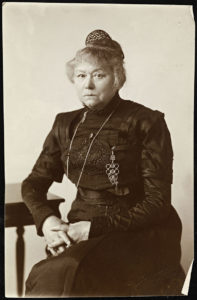 Today is the birthday of Harriet Backer (Holmestrand, Norway 21 January 1845 – 25 March 1932 Oslo); painter who achieved recognition in her own time and was a pioneer among female artists both in the Nordic countries and in Europe generally. She is best known for her detailed interior scenes, communicated with rich colors and moody lighting.
Today is the birthday of Harriet Backer (Holmestrand, Norway 21 January 1845 – 25 March 1932 Oslo); painter who achieved recognition in her own time and was a pioneer among female artists both in the Nordic countries and in Europe generally. She is best known for her detailed interior scenes, communicated with rich colors and moody lighting.
Backer produced just around 180 works of art mostly based upon local themes. Her work was both slow and thorough. In 1880, she debuted in Paris with the painting Solitude, and in 1883 exhibited Blått interiør at the Autumn Exhibition in Oslo. She was influenced by impressionism. She never belonged to any school but her work is often compared with that of her contemporary Eilif Peterssen (1852–1928). Backer worked in the tradition of realism in painting, where she is regarded as both a naturalist and an early Impressionist.
Gallery
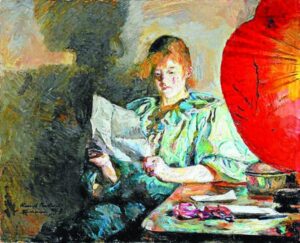
Evening interior
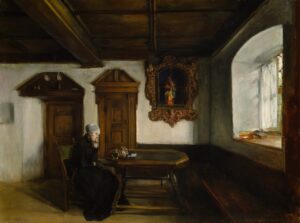
Solitude

-
Breton Interior (1882)
-

På blekevollen (1886–87)
-
Bygdeskomakere (1887)
-
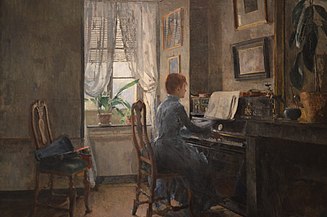
Chez Moi (1887)
-

Kone som syr (1890)
-
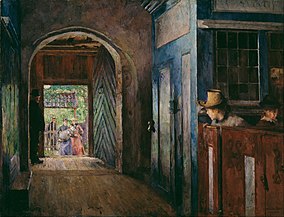
Barnedåp i Tanum kirke (1892)
-

Storebror spiller (1890)
-

Ved lampelys (1890)
-
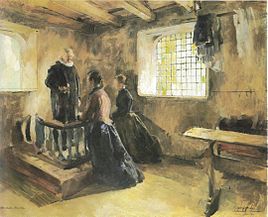
Inngangskoner (1892)
Now a love story…
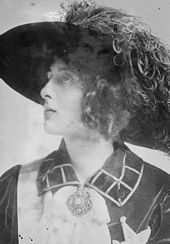
Vita Sackville-West
On this day in 1926, 33-year-old novelist Vita Sackville-West wrote an impassioned love letter to 43-year-old novelist Virginia Woolf. Vita was a distinguished English writer, had been married for more than a decade, loved her husband, and was attracted to other women. All things she had in common with Woolf.
The two women had met through the Bloomsbury Group of London, which gathered to discuss things like philosophy, literature, and art. Their romance started cautiously, but by the time Vita composed this letter four years after they had met, she was deeply smitten, languishin’ and lovesick. She was on a bumpy train ride from Milan to Trieste when she wrote:
“I am reduced to a thing that wants Virginia. I composed a beautiful letter to you in the sleepless nightmare hours of the night, and it has all gone: I just miss you, in a quite simple desperate human way. You, with all your un-dumb letters, would never write so elementary a phrase as that; perhaps you wouldn’t even feel it. And yet I believe you’ll be sensible of a little gap. But you’d clothe it in so exquisite a phrase that it would lose a little of its reality. Whereas with me it is quite stark: I miss you even more than I could have believed; and I was prepared to miss you a good deal. So this letter is just really a squeal of pain. It is incredible how essential to me you have become. I suppose you are accustomed to people saying these things. Damn you, spoilt creature; I shan’t make you love me any the more by giving myself away like this — But oh my dear, I can’t be clever and stand-offish with you: I love you too much for that. Too truly. You have no idea how stand-offish I can be with people I don’t love. I have brought it to a fine art. But you have broken down my defences. And I don’t really resent it. However I won’t bore you with any more.
We have re-started, and the train is shaky again. I shall have to write at the stations — which are fortunately many across the Lombard plain. …The waterfalls in Switzerland were frozen into solid iridescent curtains of ice, hanging over the rock; so lovely. And Italy all blanketed in snow.
We’re going to start again. I shall have to wait till Trieste tomorrow morning. Please forgive me for writing such a miserable letter.”
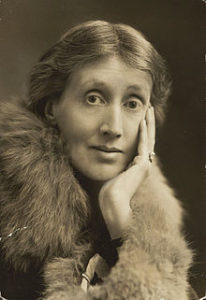
Virginia Woolf 1927
The following January, a year later, Vita wrote to Virginia:
“My darling, I hoped I should wake up less depressed this morning, but I didn’t. I went to bed last night as black as a sweep. The awful dreariness of Westphalia makes it worse: factory towns, mounds of slag, flat country, and some patches of dirty snow. … Why aren’t you with me? Oh, why? I do want you so frightfully. I want more than ever to travel with you; it seems to me now the height of my desire, and I get into despair wondering how it can ever be realised. Can it, do you think? Oh my lovely Virginia, it is dreadful how I miss you, and everything that everybody says seems flat and stupid.
I do hope more and more that you won’t go to America, I am sure it would be too tiring for you, and anyway I am sure you wouldn’t like it. … So we bundle along over Germany, and very dull it is — Surely I haven’t lost my zest for travel? No, it is not that; it is simply that I want to be with you and not with anybody else — But you will get bored if I go on saying this, only it comes back and back till it drips off my pen — Do you realise that I shall have to wait for over a fortnight before I can hear from you? poor me. I hadn’t thought of that before leaving, but now it bulks very large and horrible. What may not happen to you in the course of a fortnight? you may get ill, fall in love, Heaven knows what.
I shall work so hard, partly to please you, partly to please myself, partly to make the time go and have something to show for it. I treasure your sudden discourse on literature yesterday morning, — a send-off to me, rather like Polonius to Laertes. It is quite true that you have had infinitely more influence on me intellectually than anyone, and for this alone I love you.”
Shortly after she received this letter, Woolf came up with the idea for a new novel, inspired by Vita, who often liked to dress up in men’s clothes. That novel was Orlando: A Biography (1928), about a transgender writer who lives for hundreds of years. Vita’s son Nigel wrote, “The effect of Vita on Virginia is all contained in “Orlando” … in which she explores Vita, weaves her in and out of the centuries, tosses her from one sex to the other, plays with her, dresses her in furs, lace and emeralds, teases her, flirts with her, drops a veil of mist around her.” He calls Orlando “the longest and most charming love letter in literature.”
The two ended their affair in the late 1920s but stayed friends until Woolf’s death by suicide in 1941. There is a book out from Oxford University Press that chronicles their relationship: Vita and Virginia: The Work and Friendship of V. Sackville-West and Virginia Woolf (1993), written by Suzanne Raitt.
Missin’ You (Still)
Inspired by Vita Sackville-West
And train rides on the open plains
Blanketed in snow, so lovely
And thoughts of one that never fade…
Reduced to a thing that wants you
Composed a beautiful letter
To you in the sleepless, darkest
Hours of the night, but it is gone
I just miss you, in many ways
In desperate and human ways
You would never paint such a phrase
As elementary as that
Perhaps you would not quite feel it
I could adorn it with a phrase
So exquisite, but it might lose
A bit of its reality
For with me, it remains quite stark
I miss you ever more and more
More than I could have imagined
And I was prepared to miss you
So badly each and every day
So this poem is a squeal of pain
Hard to conceive how essential,
Memories of you have become
Supposin’ you are accustomed
To hearin’ these things from people
Damn you, you beautiful creature;
I cannot make you love me by
Givin’ myself away like this
But I cannot pretend with you
Nor be clever and stand-offish
I love you too truly for that
You have no idea how I
Pretend with those I do not love
I have brought it to a fine art
But you broke down my defences
And I don’t really resent it
Please do forgive me for writin’
Such a miserable letter
I am just followin’ the words
Hopin’ this mornin’ would find me
Less depressed but no, it did not
Went to bed as black as can be
Why are you not with me, oh, why
I do want you so frightfully
I want you now more than ever
You are the height of my desire,
And I am sent into despair
Wonderin’ how it can ever
Be realised, can it, ever
It is dreadful how I miss you
The Dark Muse directs all my thoughts
Everything that everybody
Says seems silly and insipid
Surely lackin’ a zest for life
Sisters of sorrow sigh and sigh
Comes down to this; to be with you
And not with anybody else
Supposin’ you will get so bored,
My goin’ on and on like this
Only here is the thing; it comes back
And back till it drips off my pen,
Words determined on the page
It is quite true that you have had
Infinitely more influence
On me intellectually,
In every way, than anyone,
And for this alone I love you
2012

Today is the birthday of Eugène Marie Henri Fouques Duparc (21 January 1848 – 12 February 1933); composer of the late Romantic period. Following military service in the Franco-Prussian War, he married Ellen MacSwinney, from Scotland, on 9 November 1871. In the same year, he joined Saint-Saëns and Romain Bussine to found the Société Nationale de Musique Moderne. Perhaps best known for his 17 mélodies (“art songs”), with texts by poets such as Baudelaire, Gautier, Leconte de Lisle and Goethe.
A mental illness, diagnosed at the time as “neurasthenia”, caused him abruptly to cease composing at age 37, in 1885. He devoted himself to his family and his other passions, drawing and painting. But increasing vision loss after the turn of the century eventually led to total blindness. He destroyed most of his music, leaving fewer than 40 works to posterity. In a poignant letter about the destruction of his incomplete opera, dated 19 January 1922, to the composer Jean Cras, his close friend, Duparc wrote:
| “ | Après avoir vécu 25 ans dans un splendide rêve, toute idée de représentation m’était – je vous le répète – devenue odieuse. L’autre motif de cette destruction, que je ne regrette pas, c’est la complète transformation morale que Dieu a opéré en moi il y a 20 ans et qui en une seule minute a abolie toute ma vie passée. Dès lors, la Roussalka n’ayant aucun rapport avec ma vie nouvelle ne devait plus exister. (Having lived for 25 years in a splendid dream, the whole idea of [musical] representation has become – I repeat to you – repugnant. The other reason for this destruction, which I do not regret, was the complete moral transformation that God imposed on me 20 years ago and which, in a single minute, obliterated all of my past life. Since then, [my opera] Roussalka, not having any connection with my new life, should no longer exist.) |
” |
He spent most of the rest of his life in La Tour-de-Peilz, near Vevey, Switzerland, and died in Mont-de-Marsan, in southwestern France, at age 85.
Duparc is buried at Père Lachaise Cemetery in Paris. A square in the 17th arrondissement of Paris, near the rue de Levis, is named in his honor.

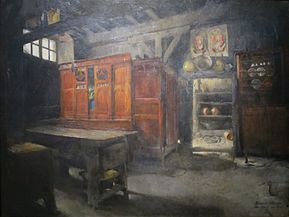

No Comments on "The Lovers’ Chronicle 21 January – still – art by Harriet Backer – Love Letter to Virginia Woolf – birth of Henri Duparc"